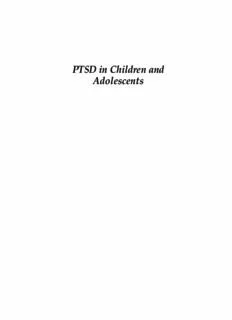
PTSD in Children and Adolescents PDF
Preview PTSD in Children and Adolescents
PTSD in Children and Adolescents Review of Psychiatry Series John M. Oldham, M.D. Michelle B. Riba, M.D., M.S. Series Editors PTSD in Children and Adolescents EDITED BY Spencer Eth, M.D. No. 1 Washington, DC London, England Note: The authors have worked to ensure that all information in this book concerning drug dosages, schedules, and routes of administration is accurate as of the time of publication and consistent with standards set by the U.S. Food and Drug Administration and the general medical community. As medical research and practice advance, however, therapeutic standards may change. For this reason and because human and mechanical errors sometimes occur, we recommend that readers follow the advice of a physician who is directly involved in their care or the care of a member of their family. A product’s current package insert should be consulted for full prescribing and safety information. Books published by American Psychiatric Publishing, Inc., represent the views and opinions of the individual authors and do not necessarily represent the policies and opinions of APPI or the American Psychiatric Association. Copyright © 2001 American Psychiatric Publishing, Inc. 04 03 02 01 4 3 2 1 ALL RIGHTS RESERVED Manufactured in the United States of America on acid-free paper First Edition American Psychiatric Publishing, Inc. 1400 K Street, NW Washington, DC 20005 www.appi.org The correct citation for this book is Eth S (editor): PTSD in Children and Adolescents (Review of Psychiatry Series, Volume 20, Number 1; Oldham JM and Riba MB, series editors). Washington, DC, American Psychiatric Publishing, 2001 Library of Congress Cataloging-in-Publication Data PTSD in children and adolescents / edited by Spencer Eth. p. ; cm — (Review of Psychiatry ; v. 20, no. 1) Includes bibliographical references and index. ISBN 1-58562-026-2 (alk. paper) 1. Post-traumatic stress disorder in children. 2. Teenagers—Mental health. [DNLM: 1. Stress Disorders, Post-Traumatic—diagnosis—Adolescence. 2. Stress Disorders, Post-Traumatic—diagnosis—Child. 3. Stress Disorders, Post-Traumatic—therapy—Adolescence. 4. Stress Disorders, Post-Traumatic—therapy—Child. 5. Forensic Psychiatry—methods. 6. Psychotherapy—methods—Adolescence. 7. Psychotherapy—methods— Child. WM 170 P975 2001] I. Title: Post-traumatic stress disorder in children and adolescents. II. Eth, Spencer, 1950- III. Review of psychiatry series ; v.20,1 RJ506.P55 .P875 2001 616.85′21—dc21 00-067404 British Library Cataloguing in Publication Data A CIP record is available from the British Library. Cover photograph: Copyright © 2001 David Oliver/Stone. To my wife, Cheryl, a woman of kindness and valor. Contents Contributors xi Introduction to the Review of Psychiatry Series xiii John M. Oldham, M.D., and Michelle B. Riba, M.D., M.S., Series Editors Introduction: Childhood Trauma in Perspective xvii Spencer Eth, M.D. Chapter 1 Evaluation and Assessmentof PTSD in Children and Adolescents 1 Evan B. Drake, Ph.D. Sherry F. Bush, Ph.D. Wilfred G. van Gorp, Ph.D. Introduction 1 Issues in the Assessment of ChildrenandAdolescents 1 Clinical Guidelines for Assessment 4 Recent Developments in Clinical Assessment 5 Multidimensional Approach to Assessment 15 Conclusions 26 References 27 Chapter 2 Forensic Aspects of PTSD in Children and Adolescents 33 James E. Rosenberg, M.D. Introduction 33 Diagnosis 34 Epidemiology 38 Genetics 39 Risk Factors in Various Settings 39 Psychophysiology 44 Assessment 45 PTSD and Memory 47 Treatment 50 Conclusions and Recommendations 51 References 54 Chapter 3 PTSD in Children and Adolescents in the Juvenile Justice System 59 William Arroyo, M.D. Introduction 59 Demographics 60 Mental Disorders 61 Posttraumatic Stress Disorder 62 Incarcerated Youth 63 Female Population 65 Predisposing Factors 65 Interventions 70 Special National Challenge 77 Summary 78 References 79 Chapter 4 Biological Treatment of PTSD in Children and Adolescents 87 Soraya Seedat, M.B. Dan J. Stein, M.B. Diagnosis and Phenomenology 88 Neurobiologic Systems in PTSD 90 Biologic Treatments in ChildrenandAdolescents 94 Assessing Outcome in ChildrenandAdolescents 104 Quality of Life 105 Conclusions 105 References 107 Chapter 5 Relationship Between Childhood Traumatic Experiences and PTSD in Adults 117 Rachel Yehuda, Ph.D. Ilyse L. Spertus, Ph.D. Julia A. Golier, M.D. Introduction 117 Long-Term Consequences of Childhood Maltreatment—Sexual Abuse, Physical Abuse, Emotional Abuse, and/or Neglect 118 Challenges in Formulating a Model of the Effects of Early Child Maltreatment on the Adult 124 Long-Term Consequences of Single-Episode Traumatic Events: Preliminary Evidence 125 Prevalence of PTSD in Children and Adults Following Childhood Trauma 127 Impact of Early Maltreatment on Reaction to Subsequent Trauma and Risk of Revictimization 129 Biological Models of the Effects of Stress: The Centrality of Sensitization as a Mechanism of Permanent Stress Responses 132 Developmental Influences of Early Stress in Animals 133 Biological Consequences in Adults Who Experienced Trauma in Childhood 135 PTSD and Other Psychological Symptoms in Adults Who Survived the Holocaust as Children 141 Methodologic Considerations in the Study of the Long-TermImpactofChildhoodTrauma 143 Summary and Conclusions 146 References 146 Index 159
Description: